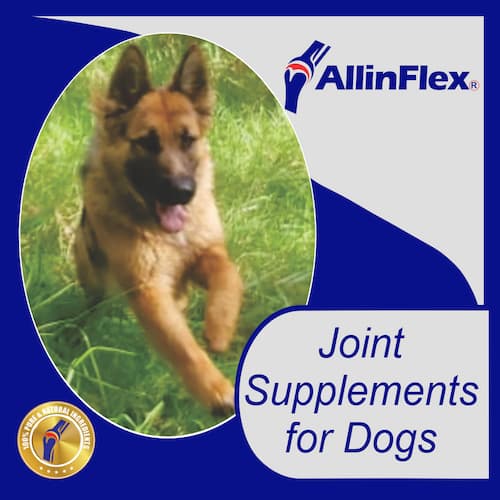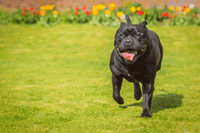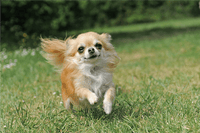Boxer Joint Health: Essential Joint Care for an Active Breed
Saskia OstermeierBoxers, with their muscular build and exuberant behavior, are prone to joint issues which can affect their mobility and comfort as they age.
Boxers are well-loved for their playful spirit, boundless energy, and distinctive appearance. As a breed that thrives on vigorous exercise and activity, maintaining optimal joint health is crucial for Boxer's longevity and overall quality of life.
In this blog post, we'll explore essential care strategies specifically tailored for Boxers to promote robust joint health. From specialised joint nutrition plans to appropriate exercise routines and preventive care measures, we aim to provide Boxer owners with actionable insights to keep these spirited dogs active and healthy throughout their lives.
Understanding Joint Health in Boxers
Boxers are an athletic breed, requiring a proactive approach to joint health due to their predisposition to issues like hip dysplasia and arthritis. Early recognition and intervention are key to managing these potential challenges effectively.
Key Aspects of Joint Health in your Boxer
- Joint Structure: Joints in Boxers, as in other dogs, consist of bones meeting at a point, cushioned by cartilage and lubricated by synovial fluid to facilitate smooth movement.
- Common Joint Problems: Due to their dynamic activities and strong build, Boxers are particularly susceptible to joint stress, which can lead to conditions such as hip dysplasia, elbow dysplasia, and early onset arthritis.
Proactive Joint Care Strategies for Boxers
To maintain healthy joints in Boxers, consider the following proactive measures:
- Weight Management: Keeping your Boxer at a healthy weight is crucial. Excess weight puts unnecessary strain on the joints, exacerbating potential problems.
- Regular Exercise: Consistent, moderate exercise helps strengthen the muscles around the joints, providing better support and reducing the risk of injuries.
- Nutritional Support: Including joint-supporting nutrients such as omega-3 fatty acids, glucosamine, and chondroitin in their diet can help maintain cartilage health and joint mobility.
Early Detection of Joint Issues in your Boxer
Spotting signs of joint discomfort early can greatly enhance the effectiveness of treatments and interventions. Signs to watch for include:
- Reluctance to Climb Stairs or Jump: This may indicate discomfort in the hips or knees.
- Limping After Resting: If your Boxer limps or shows stiffness after getting up, it might be a sign of joint issues.
- Behavioral Changes: Less enthusiasm for play or a noticeable decrease in activity levels can be early signs of joint pain or discomfort.
Nutritional Strategies for Supporting Boxer Joint Health
A well-rounded diet is essential for maintaining the joint health of Boxers. Incorporating specific nutrients that support joint function and reduce inflammation can play a significant role in preventing and managing joint issues.
Essential Nutrients for your Boxer's Joint Care
- Omega-3 Fatty Acids: These are crucial for their anti-inflammatory properties, which can help reduce joint swelling and pain. Sources like fish oil or flaxseed oil are excellent additions to a Boxer's diet.
- Glucosamine and Chondroitin: These supplements are commonly recommended to support joint health by aiding in the repair of cartilage and reducing overall wear and tear on joints.
- Antioxidants: Vitamins C and E, as well as selenium, can help protect the body's cells, including those in the joints, from oxidative stress.
Implementing a Joint-Healthy Boxer Diet
- High-Quality Commercial Foods: Look for dog foods that specifically include joint-supporting supplements like glucosamine and chondroitin. Ensure that these foods are suitable for your Boxer's age, size, and activity level.
- Homemade Meals: For those who prepare meals at home, incorporating lean meats, vegetables rich in antioxidants, and healthy oils can provide tailored nutritional support. It's important to consult with a vet or a pet nutritionist to ensure these homemade diets are balanced.
- Consistent Feeding Practices: Maintaining a regular feeding schedule and portion control helps prevent obesity, which is crucial for reducing stress on the joints.
Supplements for Enhanced Joint Health for your Boxer
In addition to a balanced diet, supplements can provide targeted support for joint health:
- Choosing the Right Supplements: Select supplements that are reputable and proven effective for dogs. It's advisable to discuss with your vet which supplements would benefit your Boxer the most, based on their specific health needs and lifestyle.
- Proper Administration: Follow the recommended dosage and administration guidelines to ensure your Boxer receives the optimal benefit from any supplements.
By focusing on tailored nutritional strategies and appropriate supplementation, you can significantly enhance the joint health of your Boxer, helping them maintain their mobility and quality of life as they age.
Exercise Recommendations for Boxer's Joint Health
Regular, appropriate exercise is crucial for maintaining the joint health of Boxers. It helps strengthen the muscles around the joints, improves circulation, and can help manage weight, which is particularly important for reducing strain on the joints.
Tailored Exercise Plans for Boxers
- Moderate Exercise: Ideal exercises for Boxers include daily walks, moderate-paced jogging, and controlled playtime that avoids excessive jumping and rough play. These activities help keep the muscles strong and the joints flexible without overburdening them.
- Low-Impact Activities: Swimming is an excellent low-impact activity that allows Boxers to exercise without putting too much stress on their joints. The buoyancy of water supports their body weight, which helps reduce the risk of joint injuries.
- Agility Training: If your Boxer enjoys more challenging activities, agility training can be adapted to be low-impact while still providing mental stimulation and physical exercise. It's important to ensure that the agility exercises are performed on surfaces that are easy on the joints, like grass or specialized mats.
Importance of Routine and Consistency for Boxers
- Consistent Schedule: Keeping a regular exercise schedule helps prevent spikes in activity that can lead to injuries. It's important for Boxers to have a routine that they can gradually adapt to, increasing their fitness and strength over time.
- Gradual Intensity Increases: As your Boxer becomes more accustomed to regular exercise, you can gradually increase the intensity of the workouts. However, it's crucial to monitor their response to increased activity, especially watching for any signs of joint discomfort or fatigue.
Monitoring and Adjustments
- Observation for Discomfort: After exercise sessions, watch for signs of joint pain such as limping or reluctance to move. If you notice any unusual signs, it may be necessary to adjust the exercise routine.
- Regular Veterinary Checks: Regular check-ups with your vet can help monitor your Boxer's joint health, ensuring that the exercise plan remains suitable for their age and physical condition.
By implementing a well-considered exercise regimen, you can significantly enhance the joint health and overall well-being of your Boxer. This approach not only helps in maintaining mobility but also contributes to a happier, healthier life for your dog.
Ensuring the joint health of your Boxer involves a combination of proper nutrition, appropriate exercise, and vigilant health monitoring. By adopting a holistic approach to care, you can help your Boxer maintain optimum mobility and enjoy a high quality of life, even as they age.
Recap of Joint Health Management Strategies for Boxers
- Nutrition: Implement a diet rich in joint-supporting nutrients such as omega-3 fatty acids, glucosamine, chondroitin, and antioxidants. Whether through high-quality commercial foods or well-balanced homemade meals, proper nutrition is fundamental to joint health.
- Exercise: Engage your Boxer in regular, moderate exercises that are tailored to their needs and physical capabilities. Incorporate low-impact activities like swimming to reduce stress on joints while maintaining overall fitness.
- Health Monitoring: Stay proactive in observing signs of joint discomfort or pain, adjusting care routines as necessary. Regular veterinary checks are crucial to assess the effectiveness of your joint health strategies and make necessary adjustments.







